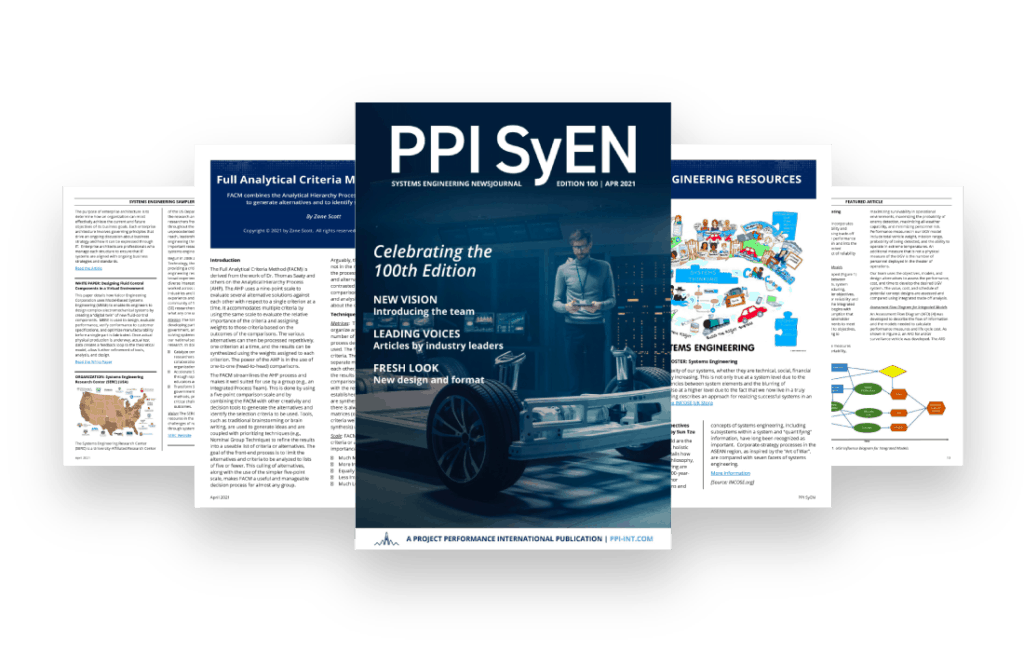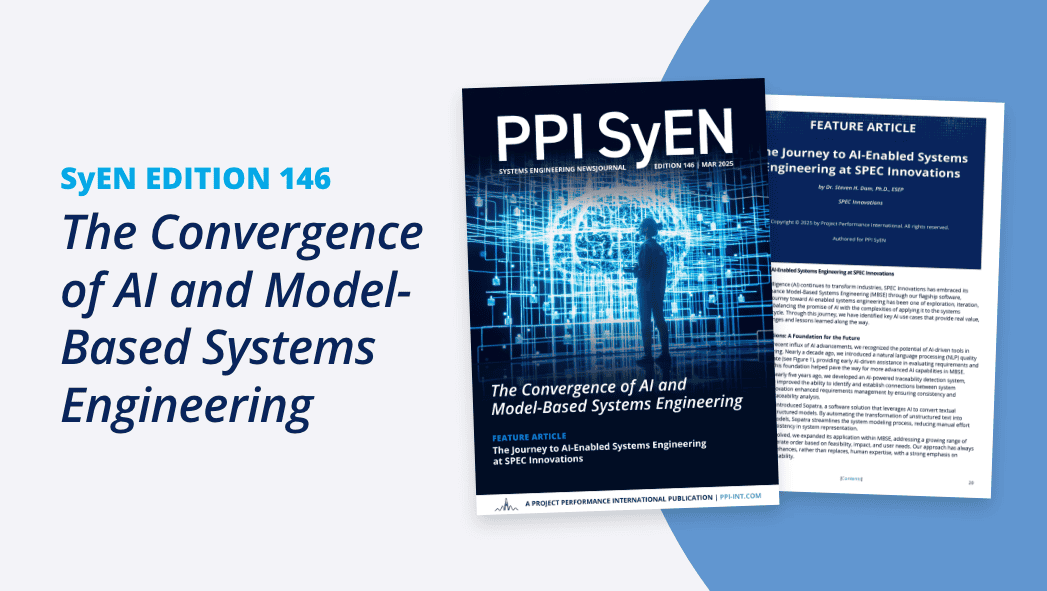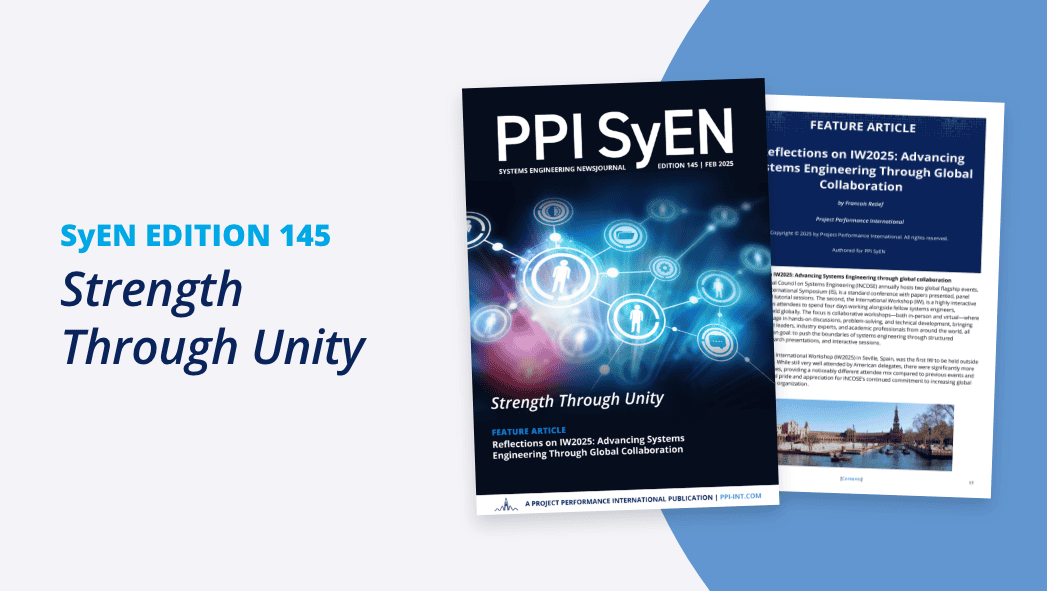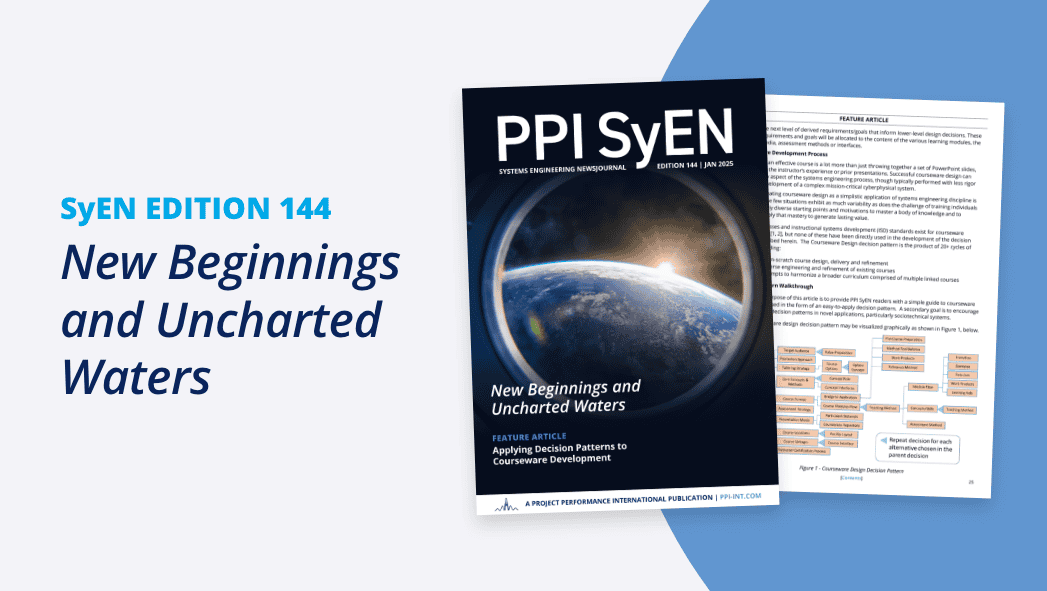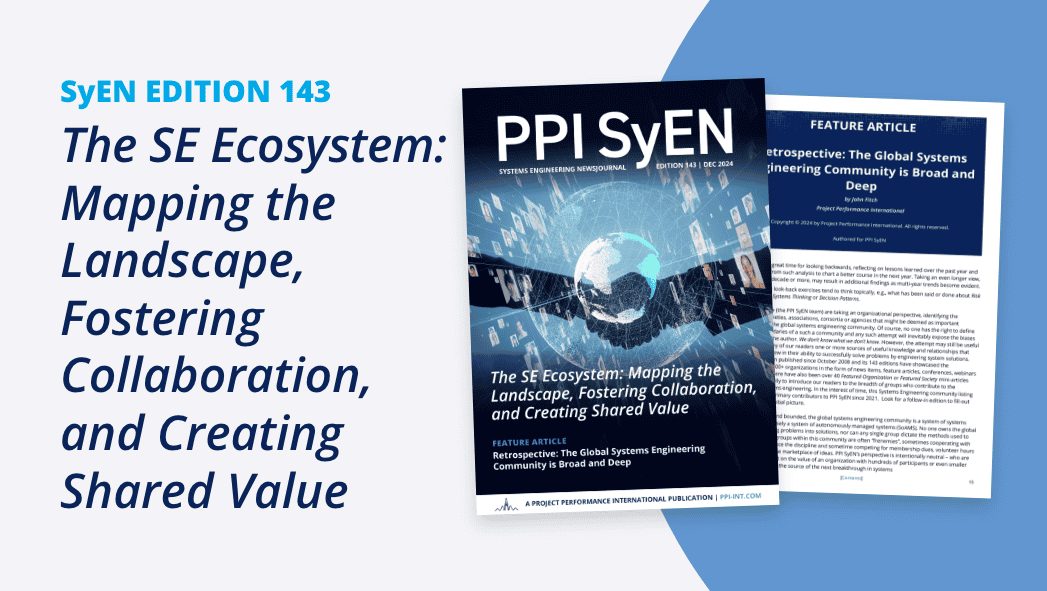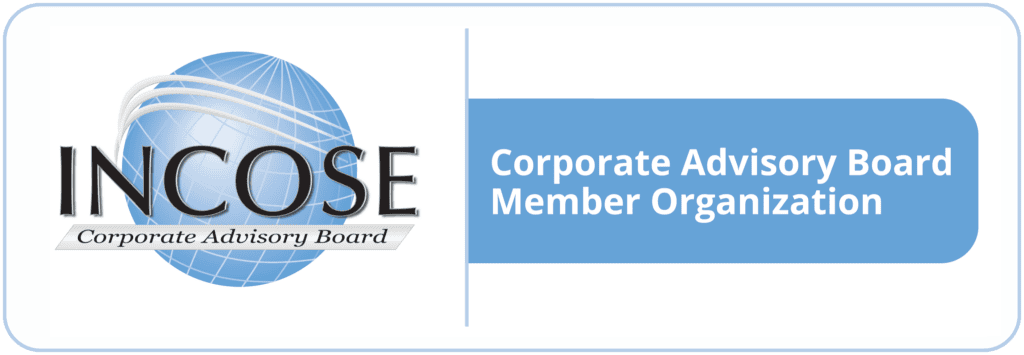WHAT’S INSIDE:
A Quotation to Open On
Feature Article: The Great Divides in Systems Engineering
Systems Engineering News
- 18th IEEE Requirements Engineering Conference (RE 2010)
- Upcoming Submission Deadlines and Themes for INSIGHT
- INCOSE eNote: News and Notes from the INCOSE Network
- Systems Engineering Certification Tutorial Webinar
- INCOSE Event Calendar
- Theme issue: Domain-Specific Modeling in Theory and Application
- INCOSE INSIGHT – October 2010, Vol 13 – Issue 3
- INCOSE Webinar October 20
Featured Societies – TBD
INCOSE Technical Operations – Verification and Validation Working Group
Systems Engineering Software Tools News
- Siemens PLM Software Launches Machine Design Solution
Systems Engineering Books, Reports, Articles and Papers
- New Multi-Million Pound Partnership Aims to Grow Systems Engineering Expertise in the Construction Industry
- System-of-Systems Engineering
Conferences and Meetings
Education and Academia
- Two Research Fellow Positions on Model Checking at National University of Singapore
Some Systems Engineering-Relevant Websites
Standards and Guides
- ISO/IEC JTC 1/SC7 Interim Meeting
A Definition to Close on
PPI News
PPI Events
A Quotation to Open On
“Genius is typically the act of an individual; incredible stupidity can usually be traced to a committee”
‘Foe Hammer’ from an Electronista post, February 15, 2010
Feature Article
The Great Divides in Systems Engineering
Dr. Joseph Kasser DSc, CEng, FIET, CM, CMALT
Joseph.kasser@incose.org
Http://therightrequirement.com
Step outside systems engineering for a moment and look back into it. Range around the perspectives perimeter (Kasser, et al., 2009)and observe what you see from the different perspectives (Kasser and Mackley, 2008). I’ve been doing this for 15 years and have come up with and researched the following hard questions that nobody else seems to be tackling.
- Why is there no universal agreed-to definition of systems engineering?
- Why are there differing views on nature of systems engineering?
- Why are there dichotomies on how to tackle the problems posed by system of systems, and complex systems? One group states that they are difficult problems that cannot be solved with current techniques while the other group just gets on with it without a fuss.
- Why does systems engineering work well sometimes?
- Why does systems engineering fail miserably (and expensively) other times?
- Why is there no widely accepted body of knowledge for systems engineering?
From the generic systems thinking perspective, these types of questions tend to be posed by an observer looking into a discipline in its formative years. A discipline in this stage is characterized by
- debates based on subjective opinions
- participants talking past each other
- a lack of listening
- contradictory and confusing information
- a number of myths
If systems engineering itself is considered as a system, then the parts can be aggregated in several ways and the following divisions show up.
- Life cycle phase gap
- Process-problem paradigms gap
- Discipline-enabler paradigms gap
- Systems thinking and non-systems thinking gap
Consider each of these divisions
Life cycle phase
Some systems engineers seem to have an understanding of the early stage systems engineering that takes place in Column A of the Hitchins-Kasser-Massie Framework (HKMF) for understanding systems engineering (Kasser and Massie, 2001; Kasser, 2007b, a). The majority however have no idea that column A even exists and don’t understand what happens in that column. The column A group tends to be the old timers; while the others tend to be those systems engineers educated in the last 20-30 years.
Process-problem paradigms
Some systems engineers are process-focussed others focus on identifying the correct problem and realizing the best solution achievable within the constraints that exist at the time. The process-focussed systems engineers‘ mantra is to apply the systems engineering process and all will be well. These are the ones who insist that organisations must modify themselves to follow a particular process. The others focus on the problem, identifying the best solution available given the constraints at the time and develop and then carry out a process to fit the situation.
Discipline-enabler paradigms
This is related to the process-problem gap. On one side, systems engineering is a [process] discipline, on the other side of the gap it’s an enabler. The discipline camp preach that systems engineering needs to widen its span to take over other disciplines while in the enabler camp, systems engineering is just a tool that can be used in all disciplines for tackling certain types of problems.
Systems thinking and non-systems thinking
This gap represents the camps that look outwards from systems engineering and those that can see systems engineering from both inside and outside. Those that can see systems engineering from outside tend to be systems thinkers who can view an issue from multiple viewpoints while the insiders tend to have a single viewpoint. The insiders generally exhibit the ‘biased jumper’ level of critical thinking (Wolcott and Gray, 2003) at least as far as systems engineering is concerned and also belong in the process paradigm. The outsiders generally also belong in the enabler paradigm.
Discussion
Still with me? If you are then I have the following questions for you.
- Are you aware of these divisions?
- On which side of each of them are you?
Do you agree with this analysis? Let’s hear from you on the INCOSE discussion reflector. If you want more information, check out the papers on my web site.
References
- Kasser, J. E., A Framework for Understanding Systems Engineering, Booksurge Ltd, 2007a.
- Kasser, J. E., “A Proposed Framework for a Systems Engineering Discipline”, proceedings of The Conference on Systems Engineering Research, Hoboken, NJ, 2007b.
- Kasser, J. E., Hitchins, D. and Huynh, T. V., “Reengineering Systems Engineering”, proceedings of the 3rd Annual Asia-Pacific Conference on Systems Engineering (APCOSE), Singapore, 2009.
- Kasser, J. E. and Mackley, T., “Applying systems thinking and aligning it to systems engineering”, proceedings of the 18th INCOSE International Symposium, Utrecht, Holland, 2008.
- Kasser, J. E. and Massie, A., “A Framework for a Systems Engineering Body of Knowledge”, proceedings of 11th International Symposium of the INCOSE, INCOSE, Melbourne, Australia, 2001.
- Wolcott, S. K. and Gray, C. J., Assessing and Developing Critical Thinking Skills, 2003, http://www.wolcottlynch.com/Downloadable_Files/IUPUI%20Handout_031029.pdf, last accessed
Systems Engineering News
18th IEEE Requirements Engineering Conference (RE 2010)
By A Smit
RE 2010 took place from September 27 to October 1, 2010 in Sydney, Australia. When I was presented with the opportunity to attend this conference, I was more than happy to add one more continent to my list of overseas visits. The land down under has long been a favourite destination for many South Africans, many who have taken a one-way trip over the last two decades. Arriving in Sydney after a 12 hour plane trip, my only interest was to find the fastest transport and the shortest route to the hotel. After a good rest I donned my walking shoes and hit the road. What an experience! Sydney is indeed a beautiful city with lots of things to do and places to see. During my first two days I first did some scouting on the City Explorer bus tour and then, by foot, visited the Darling Harbour area, the Aquarium, the Foreshore Walk from Darling Harbour to Circular Quay, Circular Quay, the Botanical Gardens, the Opera House, various shopping centres (1st on the list was of cause the Apple Store) and of course a harbour cruise. The start of the conference actually came as somewhat of a relief to my aching feet.
 The conference started on Monday 27 September with four parallel tracks covering two workshops and four tutorials. On Tuesday another five workshops were presented in parallel tracks as well as another four tutorials in four parallel tracks. The last three days consisted of paper sessions and other special sessions as well as twelve very impressive and professional looking posters displayed in the hallway.
The conference started on Monday 27 September with four parallel tracks covering two workshops and four tutorials. On Tuesday another five workshops were presented in parallel tracks as well as another four tutorials in four parallel tracks. The last three days consisted of paper sessions and other special sessions as well as twelve very impressive and professional looking posters displayed in the hallway.
On Wednesday morning Mary O’Kane, NSW Chief Scientist and Engineer, gave the keynote on “Requirements Engineering for Expensive Technologies Which need to Operate in Underconstrained Policy Systems that are Interdependent with National and Regional Economies”. She highlighted the special challenges facing large renewable energy projects a time of great uncertainty about policies on climate change and emissions control.
The keynote on Thursday morning was given by Professor Al Davis, University of Colorado at Colorado Springs, USA on “Requirements: A Textbook Example of Goals Displacement”. He stressed that the goal of requirements engineering (or requirements management) is to increase the likelihood that the end product of the endeavour does in fact create value for stakeholders. Quoting from the abstract “Instead, we see displaced goals like: create a perfect software requirements specification (SRS); check an SRS for some combination of completeness, consistency, non-ambiguity, etc; automatically generate (or analyze) some formalized modelling notation; follow an onerous 20-step process; or automatically transform one modelling notation into another. Woefully few (although there are some terrific exceptions!) published papers connect the requirements process with its real goal: value creation.”
The keynote at the closing plenary on Friday was given by Graeme Simsion of Simsion & Associates on “Being Right Isn’t Enough”. The key message was that the greatest challenges in practical requirements engineering are psychological and political rather than technical and that the requirements engineer is quite often also communicator, interpreter, facilitator, conciliator, negotiator, salesman and sometimes counsellor.
The social events associated with this conference were something to remember. Firstly the welcome reception took place at the Opera Bar at……you guessed it, the Sydney Opera House. The conference banquette was an unforgettable harbour cruise dinner on the Blue Room departing from Star City Warf, Pyrmont.
Being the first IEEE RE conference that I attended, it was very apparent that the general attendance and the presentation of papers were predominantly from the software engineering industry. What was also surprising to see was the huge research component: nine research sessions presented compared to the five industry practice and experience sessions.
Current requirements engineering practices in my own environment were confirmed and renewed emphasis has been placed on spending enough time in doing RE and paying particular attention to requirements traceability. Some techniques that I want to investigated further is cognitive mapping and i* modelling. The most promising research papers were on automated requirements tracing and the most interesting were on linguistic analyses to improve requirements quality.
 In a fitting conclusion to a wonderful trip, I visited the Blue Mountains on my last day in Australia. Having walked down the Furber steps into the Jamison Valley beside Katoomba Falls, the near vertical (so it felt) train trip back up was awe inspiring.
In a fitting conclusion to a wonderful trip, I visited the Blue Mountains on my last day in Australia. Having walked down the Furber steps into the Jamison Valley beside Katoomba Falls, the near vertical (so it felt) train trip back up was awe inspiring.
Sitting on the plane on the long trip back home, I could not help but wonder why requirements engineering still seems to be so much of a stumbling block for the successful execution of projects if there is so much research going on. Are we really making sure that we tailor the breadth and depth of the RE effort to only that which adds value to our particular project? Do we really devote enough time to the RE effort or are we pressured into a rushed completion of specifications in order to get hardware and software that we can show for our effort? Are we meticulous enough with the wording of requirements and with traceability? Most importantly, do we do enough to train young practitioners in the ABC of RE to fast track them on the road to becoming proficient requirements analysts?
And O! Does the INCOSE RE working group and the IEEE cooperate at all on RE?
Upcoming Submission Deadlines and Themes for INSIGHT
INSIGHT is the newsletter of International Council on Systems Engineering. It is published four times per year (January, April, July, October). INSIGHT features status and information about INCOSE’s technical work, local chapters, and committees and boards. Additionally, related events, editorials, book reviews, trends, and how-to-do articles that are pertinent to the many aspects of a systems engineer’s job are also included, as space permits.
Upcoming submission deadlines and themes for INSIGHT
INCOSE eNote: News and Notes from the INCOSE Network
eNote is the electronic newsletter of INCOSE. Published every four to six weeks, eNote is a compilation of INCOSE news, event announcements, and items of interest for our members. Subscriptions to eNote are available to INCOSE members as part of their membership.
eNote features INCOSE information as well as notes from systems engineering and related fields. Questions and comments as well as submissions for future eNotes should be directed to the eNote Editorial Team.
Systems Engineering Certification Tutorial Webinar
Beginning Thursday, October 7th 2010 and running through April 2011, the tutorial consists of 16 weekly sessions, held from noon to 1:30 p.m., Eastern Time USA, for up to 300 INCOSE and 250 NGC participants. There is no need to pre-register and no cost, just join in. The LiveMeeting sessions will be open 30 minutes before the start time. Prior to each session, participants are encouraged to read the sections and appendices of the SE Handbook to be presented. Course materials include the course schedule, tutorial slides (including PowerPoint Notes), sample questions, and prior-session audio and video recordings for later downloading if you miss a class.
For more information go to the INCOSE website.
INCOSE Event Calendar
| German Chapter Annual Systems Engineering Conference (TdSE2010) | Nov 10 – 12, 2010 |
| INCOSE UK Annual Systems Engineering Conference (ASEC 2010) | Nov 08 – 10, 2010 |
| Cyber Security and Enterprise Architecture Conference hosted by Hampton Roads Area and ISSA-HR | Nov 03 – 04, 2010 |
| 15th Annual INCOSE Region II Fall Mini-Conference | Oct 30, 2010 |
| First International Conference on Complex Systems Design and Management (CSDM 2010) | Oct 27 – 29, 2010 |
Theme issue: Domain-Specific Modeling in Theory and Application
The Journal of Software and Systems Modeling (SoSyM) invites original, high-quality submissions for its theme issue on “Domain-Specific Modeling” that is focused on topics related to DSM.
INCOSE INSIGHT – October 2010, Vol 13 – Issue 3
The October 2010 INSIGHT is ready to view or download on INCOSE Connect.
Special Feature: INCOSE’s Twentieth Anniversary International Symposium
INCOSE Webinar October 20
Dr. Steven H Dam will give a presentation on “Building you Concept of Operations”. You will find a copy of the joining instructions on the INCOSE Connect website, in the Webinar Discussion Forum area: https://www.incose.org/forum/index.cfm?page=forum&forumID=8
Joining instructions are also posted in the INCOSE Product Area, within the webinar Archive folder.
Featured Society – TBD
TBD
More information
INCOSE Technical Operations
Verification and Validation Working Group
http://www.incose.org/practice/techactivities/wg/vvwg/
Charter
The BWG Charter is to promote practical application of systems engineering best practices and standards to the Verification and Validation Industry.
Leadership
Chair: Ben Mancuso
Co-Chair: Bram Landtsheer (Acting)
Contact Ben.Mancuso@incose.org for additional information or to join this group.
Published Products
- V&V Terminology (pending)
- AFIS V&V Overview
Planned Work
- Partnering with AFIS IVVQ WG
- Partner with Requirements WG
- Meeting Planned for April 2008
- Partner with Risk WG
- Partner with Lean SE WG
Presentations
![]() 2008 International Workshop Verification and Validation WG Summary Presentation Size: 200K
2008 International Workshop Verification and Validation WG Summary Presentation Size: 200K
Systems Engineering Software Tools News
Siemens PLM Software Launches Machine Design Solution
Siemens PLM Software is targeting manufacturers of machine tools and production machines with a new variation on its PLM platform that takes a systems engineering approach to facilitate design.
Mechatronics Concept Designer, based on the NX CAD software and Siemens Teamcenter PLM platform, delivers on the systems engineering approach by melding “voice of the customer” input and early requirements with a multi-discipline product definition that includes mechanical, electrical and software components.
Systems Engineering Books, Reports, Articles and Papers
New Multi-Million Pound Partnership Aims to Grow Systems Engineering Expertise in the Construction Industry
Imperial College London and Laing O’Rourke have formed a new multi-million pound partnership that is developing an MSc course to help construction industry professionals adopt world class systems engineering techniques, it is announced today.
The Imperial and Laing O’Rourke partnership will focus on innovation in the systems engineering field, which looks at how complex engineering projects are designed and managed. Laing O’Rourke is the largest privately-owned engineering enterprise in the UK.
System-of-Systems Engineering
The focus of Carnegie Mellon Software Engineering Institute (SEI) research in this area is on the ways in which the characteristics of systems of systems call for a transformation of system-of-system engineering practices. In particular, we see that the successful development of complex systems of systems requires a new set of concepts, a revised set of life-cycle activities, attention to the role of emergence, and the application of a different set of technologies and techniques.
One life-cycle phase we are looking at is requirements engineering. Our investigation tells us that techniques and approaches for requirements engineering in a system-of-systems environment are not well understood because
- A system of systems is owned and evolved by different organizations.
- System-of-systems constituents are at different points in their life cycles.
Conferences and Meetings
NDIA 13th Annual Systems Engineering Conference
October 25-28, 2010, Hyatt Regency Mission Bay, San Diego, CA, USA
Requirements Days 2010
October 26 – 28, 2010, Mϋnchen, Germany
2010 Huntsville Simulation Conference (HSC2010)
October 26-28, 2010, Huntsville Marriott, Huntsville, Alabama, USA
5th International Workshop on Enterprise Integration, Interoperability and Networking (EI2N’2010)
October 27-28, 2010, Hersonissou, Crete, Greece
Complex Systems Design & Management 2010
October 27-29, 2010, Paris, France
15th Annual INCOSE Region II Fall Mini-Conference
October 30, 2010, National University – La Jolla Campus, San Diego, CA, USA
12th IEEE International High Assurance Systems Engineering Symposium (HASE 2010)
Co-Located with the 21st IEEE International Symposium on Software Reliability Engineering (ISSRE)
November 1-4, 2010, San Jose, CA, USA
29th International Conference on Conceptual Modeling
1-4 November 2010, Vancouver, BC, Canada
Seventh International Workshop on Web Information Systems Modeling (WISM 2010)
(Held in conjunction with ER 2010)
November 1-4, 2010, Vancouver, BC, Canada
25th International Forum on COCOMO and Systems/Software Cost Modeling
November 2-5, 2010, University of Southern California, Los Angeles, CA, USA
2010 IITA International Conference on Control, Automation and Systems Engineering (CASE 2010)
Nov 7, 2010 – Nov 8, 2010. Taipei, Taiwan
No Magic World Conference
November 7-10th, 2010, American Airlines Conference Center, Fort Worth, TX
INCOSE UK Annual Systems Engineering Conference 2010 (ASEC10)
November 8-10, 2010, Heythrop Park Hotel, Chipping Norton, Oxfordshire, UK
13th Brazilian Symposium on Formal Methods (SBMF 2010) ![]()
November 8th – 12th, Natal, Brazil
SEPG Latin America 2010
November 10-12, 2010, Medellín, Colombia
Association for the Advancement of Artificial Intelligence (AAAI)
Fall Symposium: Complex Adaptive Systems: Resilience, Robustness, and Evolvability
November 11 – 13, 2010, Arlington, VA
5th Trends in Enterprise Architecture Research (TEAR2010) workshop
November 12, 2010 as part of the Enterprise Engineering Week at the Delft University of Technology, Delft, The Netherlands from the 9th of November to the 12th of November
CMMI 10th Annual Technology Conference and User Group
November 15-18, 2010
Hyatt Regency Tech Center – Denver, Colorado, USA
Third IEEE International workshop UML and Formal Methods
Held in conjunction with the 12th International Conference on Formal Engineering Methods, ICFEM 2010
November 16th, 2010, Shanghai, China
5th International Forum on Engineering Education (IFEE2010) & European SDPROMO II Conference
November 23 – 25, 2010, Sharjah-Dubai, UAE, United Arab Emirates
1st International Chemical and Environmental Engineering Conference 2010
November 26 – 28, 2010, Kuala Lumpur, Malaysia
2010 International Conference on Computer and Software Modeling – (ICCSM 2010) ![]()
December 4-5, 2010, Manila, Philippines
22nd International Conference Software & Systems Engineering and their Applications (ICSSEA 2010)
December 7-9, 2010, Paris, France
National Institute of Technology – National Systems Conference 2010
December 10-12, 2010, National Institute Technology Karnataka, Surathkal, India
ICISE 2010: International Conference on Intelligent Systems Engineering
December 18, 2010, Bangkok, Thailand
ICECSE 2011 “International Conference on Electrical, Computer and Systems Engineering”
January 25-27, 2011, Dubai, United Arab Emirates
INCOSE International Workshop 2011 (IW 2011) ![]()
January 29 – February 01, 2011, Hyatt Regency Phoenix, Phoenix, AZ, USA
Second International Conference on Exploring Services Sciences (IESS 1.1)
February 16-17-18, 2011, Geneva, Switzerland
Second ACM/SPEC International Conference on Performance Engineering
(ICPE 2011)
March 14-16, 2011 Karlsruhe, Germany
Design, Automation & Test in Europe
March 14-18, 2011, Grenoble, France
26th Symposium On Applied Computing
March 21 – 25, 2011, Tunghai University, TaiChung, Taiwan
Requirements Engineering Track – 4th Edition
part of the 26th ACM Symposium on Applied Computing
March 21 – 25, 2011, Tunghai University, TaiChung, Taiwan
Requirements And Validation, Verification & Testing (ReVVerT 2011) ![]()
March 21-25, 2011 (one day), Berlin, Germany
IWEI 2011 – The International Working Conference on Enterprise Interoperability
March 22-24, 2011, Stockholm, Sweden
MoBE-RTES 2011 – 2nd IEEE Workshop on Model-based Engineering for Real-Time Embedded Systems (MoBE-RTES 2011)
Mar 28, 2011, Newport Beach, California, USA
REFSQ 2011 – 17th International Working Conference on Requirements Engineering: Foundation for Software Quality
March 28-30, 2011, Essen, Germany
MBT 2011 – Seventh Workshop on Model-Based Testing![]()
April 2-3, 2011, Saarbrϋken, Germany
Satellite workshop of ETAPS 2011
IEEE International Systems Conference
April 4-7, 2011, Montreal, Quebec, Canada
Risk-Based Approaches to Major Decisions (Risk ’11)
May 13 – 14, 2011, Falmouth, Cornwall, United Kingdom
SPICE 2011 – The 11th International SPICE Conference Process Improvement and Capability dEtermination ![]()
30 May – 1 June 2011, Dublin, Ireland
Seventh European Conference on Modelling Foundations and Applications ![]()
6-9th of June, 2011, University of Birmingham, Birmingham, UK
10th TTCN‑3 User Conference ![]()
June 7-9, 2011, Bled, Slovenia
4th Symposium on Resilience Engineering ![]()
June 8-10, 2011, Sophia Antipolis, France
FM 2011: 17th International Symposium on Formal Methods
June 20 – 24, 2011, Lero, Limerick, Ireland
The 32nd International Conference on Application and Theory of Petri Nets and Concurrency (PETRI NETS 2011)
11th International Conference on Application of Concurrency to System Design (ACSD 2011)
June 20-24, 2011 Kanazawa Cultural Hall, Kanazawa, Japan
INES 2011 – 15th IEEE International Conference on Intelligent Engineering Systems 2011
June 23-25, 2011, Poprad, High Tatras, Slovakia
SoSE 2011 – 2011 6th International Conference on System of Systems Engineering (SoSE)
Jun 27 – 30, 2011, Albuquerque, New Mexico, U.S.A
19th IEEE International Requirements Engineering Conference
August 29 – September 2, 2010, Trento, Italy
Education and Academia
Two Research Fellow Positions on Model Checking at National University of Singapore
Highly motivated applicants are being sought to work on developing model checking techniques. The postdocs will work with the software engineering and formal methods group at National University of Singapore on further developing the PAT toolkit (http://pat.comp.nus.edu.sg).
Some Systems Engineering-Relevant Websites
TBD
Standards and Guides
ISO/IEC JTC 1/SC7 Interim Meeting
Registration is now open for the interim meeting at https://www.fbcinc.com/nist_ISOSC7/atreg1.aspx
It is essential that all participants register at least four weeks before the meeting date: The deadline for registration is Monday, October 4, 2010. Advance registration is required for all participants, both US and non-US. Unregistered persons arriving at NIST cannot be admitted.
A Definition to Close on
TBD
PPI News
TBD
PPI Events (see www.ppi-int.com)
Systems Engineering Public 5-Day Courses (2010)
{Julie to plug in}
Requirements Analysis and Specification Writing Public Courses (2010)
{ Julie to plug in}
Software Engineering Public 5-Day Courses (2010)
{ Julie to plug in}
OCD/CONOPS Public Courses (2010)
{ Julie to plug in}
Cognitive Systems Engineering Courses (2010)
{ Julie to plug in}
PPI Upcoming Participation in Professional Conferences
{ Julie to plug in}
Kind regards from the SyEN team:
Robert Halligan, Managing Editor, email: rhalligan@ppi-int.com
Alwyn Smit, Editor, email: asmit@ppi-int.com
Luke Simpson, Production, email: lsimpson@ppi-int.com
Project Performance International
2 Parkgate Drive, Ringwood, Vic 3004 Australia
Tel: +61 3 9876 7345
Fax: +61 3 9876 2664
Tel Brasil:
Tel UK:
Tel USA:
Web: www.ppi-int.com
Email: contact@ppi-int.com
Copyright 2009 Project Performance (Australia) Pty Ltd, trading as Project Performance International
Tell us what you think of SyEN: email to contact@ppi-int.com
If you do not wish to receive a copy monthly of SyEN in future, please reply to this e-mail with “Remove” in the subject line. All removals are acknowledged; you may wish to contact PPI if acknowledgement is not received within 7 days.
